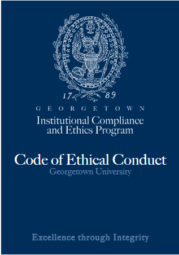FAQs
Answers to Common Questions About Compliance at Georgetown
- What is “compliance and ethics?” Compliance with what?
Most people think “compliance” means following the rules. Rule-following is certainly important, but at Georgetown, we use the term “compliance and ethics” more broadly to describe the process through which we maintain a culture of integrity and assure ourselves and others that we are operating the Georgetown way–in accordance with applicable rules and standards and in keeping with our traditions, identity and values. Georgetown is a complex institution that engages in a broad array of activities and is subject to laws, regulations, standards and policies that apply to education, research, athletics, public safety, information security, human resources, tax, environmental issues, and many other areas.
- Why has Georgetown implemented a compliance program?
To bolster Georgetown’s long-standing culture of integrity, to help identify, understand and meet the many legal, regulatory and other obligations we face, to support and coordinate the many people and offices who are responsible for these obligations, and to manage the risk associated with compliance issues and problems. The compliance program relies on all members of the University community and empowers them to raise questions and concerns and report compliance-related problems.
- What is the Code of Ethical Conduct?
The Code is Georgetown’s statement of shared principles and expectations for the conduct of University activities. It describes the fundamental notions of integrity and ethical behavior that form the bedrock of the Compliance and Ethics Program. By articulating the basic principles and standards that guide us and providing helpful references to relevant University resources, the Code is a useful guide to ethical decision-making.
- How do I know if there is a compliance issue? What should I do if I think there is a compliance issue?
Any situation, activity or transaction that could potentially violate a law or regulation or the University’s policies or procedures could be a compliance issue. If you are concerned that an activity is inappropriate given your understanding of applicable law or University policy, or if you encounter a situation that feels wrong or makes you uncomfortable, you should speak to your supervisor and/or contact the University office that manages the area in which the issue has arisen. If, for whatever reason, you are uncomfortable going through these “regular channels,” or if you have raised an issue with appropriate people but feel that it has not been addressed, you can make a report through the University’s Compliance Helpline.
- What is the Compliance Helpline?
The Georgetown University Compliance Helpline is the University’s compliance reporting “hotline.” It provides a confidential (and anonymous, if desired) way to raise concerns, ask questions, or report problems. It is easy to use–you can make a report online or through a toll-free telephone number–and is operated outside the University’s server by an independent report manager (Navex Global/Ethicspoint). To access the Helpline, click on the picture of Jack the Bulldog on this or any other page of the Office of Compliance and Ethics website or dial 888-239-9181.
- What types of issues are reportable through the Compliance Helpline?
The Compliance Helpline is for reporting issues or problems that you believe violate the law, a regulation or University policy and for which regular reporting channels are inappropriate. If you have doubts about whether an issue should be reported through the Compliance Helpline, report it–the Office of Compliance and Ethics can help to refer it if necessary. The Compliance Helpline is not an emergency reporting mechanism–in an emergency you should contact the Department of Public Safety or dial 911.
- Can I be punished for reporting something through the Helpline in good faith?
No. Reports through the Compliance Helpline (and reports made through other University channels) are covered by the Whistleblower Protection Policy, which recognizes that reporting is a service to the University and prohibits retaliation of any kind for reports that are made in good faith. (see Whistleblower Protection Policy page).
Code of Ethical Conduct


